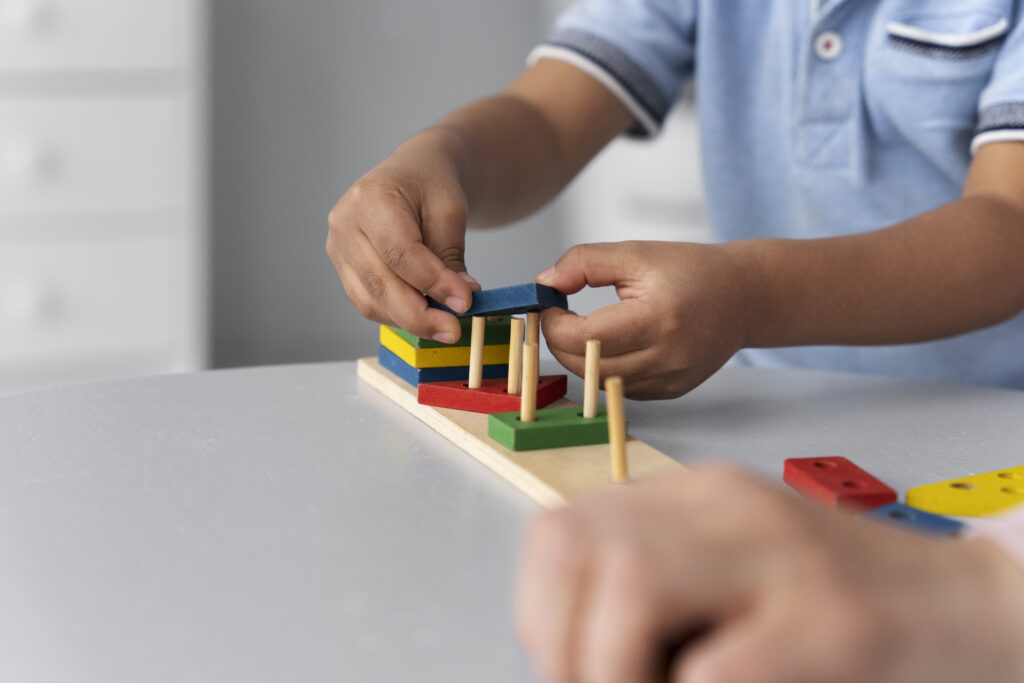As parents, it is a happy moment to see our children grow and develop. One of the critical aspects of their development is the progression of fine motor skills, which involves the coordination of small muscles in their hands and fingers. However, delays in motor development, whether fine or gross, can sometimes indicate the need for additional support or assessment. Recognizing these milestones helps ensure your child is on the right track and allows you to provide support where needed. We will highlight essential fine motor skill milestones in young children from infancy through early childhood.
Fine Motor Skill Developmental Indicators in Infants, 0-12 Months
Infants’ fine motor skills increase enormously during the first year of life. All these early skills serve as a basis for complex actions later.
0-3 Months:
Grasp Reflex: A newborn’s automatic grasp reflex is the cause of holding onto objects placed in the newborn’s palms.
Hand to Mouth: From 2-3 months, babies begin bringing their hands to their mouths and show proper coordination.
4-6 Months:
Reaching and Grasping: Infants start reaching for toys or objects and grasp them with a palmar grip, using their whole hand.
Hand Transfer: By 6 months, infants usually transfer objects from one hand to the other, showing increased mastery.
7-12 Months:
Pincer Grasp: Between 9 to 12 months, babies master a pincer grasp, using their thumb and forefinger to pick up small items like Cheerios.
Finger Feeding: At the same time, they begin feeding themselves finger foods to hone their fine motor skills.
Fine Motor Skills in Toddlers (1-3 years)
At this stage of becoming a toddler, children continue developing their fine motor skills to manipulate objects using hands and fingers more complexly.
12-18 Months:
Block Stacking: It is normal when a child learns to stack two to three blocks, showing his hand-eye coordination.
Use of Utensils: Toddlers start using spoons and forks for eating, but they can still be messy
18-24 Months:
Scribbling: Simple scribbling with crayons or markers becomes more common and they demonstrate some early aspects of writing.
Turning Pages: This is when they can turn one page at a time of a board book and learn about the operation of objects
2-3 Years:
Puzzle Solving: Many children can solve simple puzzles with big pieces by the time they are 3 years of age.
Threading Beads: This is a huge accomplishment when they thread large beads on a shoelace or string. Their hand stability and coordination improve dramatically.
Fine Motor Skill Achievements for Preschoolers (3-5 Years)
As the preschool period begins, fine motor skills improve dramatically, so the child is now able to accomplish a lot more things with small movements in his hands.
3-4 years:
Drawing Shapes: Drawing shapes like circles and squares is routine.
Handling Small Objects: A child will handle small things like buttons and zippers so that he could dress himself properly.
4-5 years:
Scissor Cutting: She will be able to cut a straight line along a drawn one or around the drawn shapes using her child-safe scissors.
Writing Name: Around the time of 5 years, many children can scribble some of their name letters and draw relatively recognizable pictures.
Promote Fine Motor Development
It’s essential to help your child foster fine motor skill development through games that involve her hands and fingers. Here are some suggestions:
Play Dough: Squishing, rolling, and shaping the play dough has a strengthening effect on hand muscles while improving coordination.
Building Blocks: Playing with building blocks such as LEGO helps hone grasping and piling skills.
Arts and Crafts: Coloring, cutting paper, and sticking stickers, among others, helps develop dexterity.
Minor Household Chores: Engaging your child to put away his or her toys, putting the dishes away, or sorting laundry, for instance, develop practical skills.
When to Consider Reaching Out to a Specialist
While children develop at their own pace, it’s important to consult with a pediatrician or occupational therapist if you notice significant delays in fine motor skills or if your child struggles with tasks that seem age-appropriate. Early intervention can provide the necessary support to help your child catch up.
The Family Health Checker app provides parents with an AI-powered platform for addressing concerns about their child’s developmental and genetic health, offering free and easy-to-use assessments. Many developmental delays may be linked to genetic factors and early diagnosis and intervention are essential. After completing the assessment, parents receive a free report that highlights potential areas of concern. The app includes features for connecting with healthcare professionals for further evaluation and offers a no-cost genetic test for children who qualify. With its secure, user-friendly design and compatibility across various devices, the Family Health Checker app enables parents to assess their child’s development comfortably from home. Although AI tools can help speed up the diagnostic process, consulting a healthcare professional for a formal diagnosis and personalized guidance is vital.



